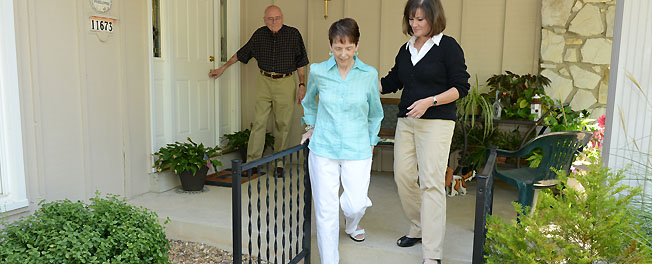
Participation, Environment and Performance Laboratory
General Laboratory Description
General Laboratory Description The clinical translational research of the Participation, Environment and Performance Laboratory (PEPL) focuses on the unique contribution that the environment can make toward improving the performance, participation and quality of life for persons living with functional limitations. Dr. Stark and her team study how the environment accounts for the differences between what individuals are capable of doing and their actual participation. An exploration of the physical environment as influencing behavior is the basis of research questions studied by the lab. Most studies focus on the challenges faced by older adults in underserved communities in urban St. Louis. Members of the lab participate in team science with colleagues from a variety of disciplines including engineering, pharmacy, nursing, neurology, psychiatry, and medicine. Our older adult community advisory group members and community partners are integral to our team and enhance our community-engaged approach.
General Description of Student Activities
Trainees are important members of the PEPL research team. Our trainees range from high school to post-doctoral levels of training and represent a broad range of disciplines. We highly value the opportunity to provide training for underrepresented groups including race, gender identify and disability. All trainees assist with all aspects of implementing our studies including delivering occupational therapy interventions, data collection, data analysis and dissemination of our work. Students should consider this laboratory if they are interested in how the environment can impact occupational performance and community participation, and if they are interested in clinical translational research, community engaged research, evidence-based practice and translating evidence into practice. We welcome volunteers who would like to explore our lab.
Examples of Projects
- Falls among people with preclinical Alzheimer disease
- Effectiveness study of home hazard removal to reduce falls
- Feasibility study of a transitional program for older adults leaving inpatient rehabilitation after stroke
- Barriers to participation for people with long-term physical disabilities
- Barriers to retention in longitudinal studies of Alzheimer disease
- Identifying barriers in the homes of underserved older adults
- Developing an intervention to improve medication adherence for older adults with multi-morbidity
PhD Mentor Information
Dr. Stark’s clinical translational research program focuses on the development and implementation of evidence-based behavioral interventions delivered in the home to prevent falls and improve community participation. Her federally and privately funded studies explore how functional decline and environmental barriers interact to influence the performance of frail older adults with chronic conditions. The interventions she develops from these studies allow older adults to age in place independently and safely at home.
Current Research Projects
- The Removing Home Hazards for Older Adults Living in Affordable Housing project translates fall prevention research into an effective home hazard removal program delivered in affordable senior housing facilities.
- Compass II (Community Participation Transition after Stroke) is a phase IIb trial among patients undergoing inpatient rehabilitation for stroke that investigates the efficacy and safety of a transition program to remove environmental barriers and improve performance and community participation.
- The Building Capacity to Improve Community Participation for People Aging with Long-term Disability Through Evidence-based Strategies project establishes a regional community-based research network (CBRN), conducts a cohort study of barriers to and facilitators of community participation, and facilitates the translation of evidence for Centers for Independent Living and Area Agencies on Aging.
- The Falls and Alzheimer’s Disease project examines the relationship between falls and functional mobility in pre-clinical stages for Alzheimer’s Disease and conducts assessments related to fall risks and functional mobility in participant’s homes annually for four years.
For additional information, please visit starklab.wustl.edu/research.

